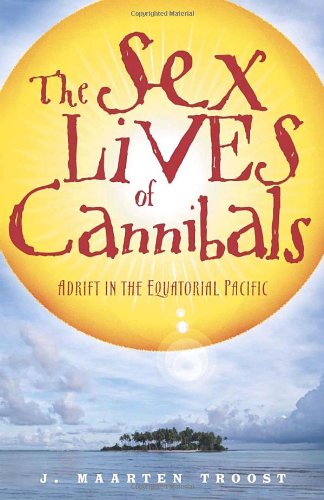He heads off to an island in the South Pacific which is hotter than Washington, D.C. in August, with humidity like a wet blanket. Unemployment is 70 %. Troost laments the scarcity of clean water, electricity, and variety in food. He has frightening encounters with sharks and the sheer power of the Pacific Ocean. And he meets the Poet Laureate of Kiribati, a crass 21-year-old from the UK who had the audacity to propose himself for the position, even enclosing in his letter a cheesy poem which incorrectly rhymed “Kiribas” with “me” and “tree.” The government accepted his proposal, granting him a hut overlooking a lagoon, “to live the simple, literary life in Kiribati.”
Even if snarkiness isn’t entirely to my taste, I found Troost’s narrative infectious. His prose could use some occasional polishing, but he admits as much: “As careful readers may have already surmised, I favor the ditches of digression.” Perhaps his self-deprecation won me over. There’s also his sympathy for the peoples of the region – think of nuclear weapons testing.
It turns out I have two things in common with Troost. One is that we both lived in the former Czechoslovakia in the early 1990s, and I recall his columns from The Prague Post (I’m still envious that he had such a position fresh out of college).
The other is that the rap hit “Ice, Ice Baby” figured for both of us as a harbinger of Westernization. In my memoir Slovakian Rhapsody (forthcoming – I’m hunting for an agent and have made public readings of this excerpt), I relate how a teenager had me transcribe the lyrics of the song for him so he could perform it at a high school dance. He bombed, couldn’t even finish before being whistled/booed off stage.
Troost’s scene takes place in a maneaba, a large communal hut where the elders and other villagers gather. After some traditional dances, “a group of boys marched into the center of the maneaba and they looked like trouble. They wore droopy shorts. And bandanas around their heads. They glowered menacingly. Someone turned on a boom box….”
The author anticipates the reaction of the elders, “who could recite their genealogies back five hundred years and more, who knew how to read the water and the sky, who knew how to build things as large as a maneaba without a nail, who knew, in short, how to survive on an equatorial atoll on the far side of the world.”
Their response?
“I am saddened to report that [they]… smiled and nodded in time to the music, gleefully watching their grandsons prance around like junior varsity pimps. End this madness now! I felt like yelling. Trust me! It’s for your own good. ”
I know the feeling. And I share the hope that not everything will be ruined by commercialization. “Traditional singing and dancing existed not for the benefit of package toutists, but as a way to amuse and engage the people themselves once dusk put a definitive end to the day’s work. The lagoons were clean, untampered with by clogging causeways…, and on the turquoise surface, men fished in skillfully crafted sailing canoes.”
Finally, I’ve experienced the reverse cultural shock—upon returning to the U.S.—that Troost so vividly depicts in the end.
A worthy book indeed.
The Sex Lives of Cannibals: Adrift in the Equatorial Pacific, by J. Maarten Troost

 RSS Feed
RSS Feed